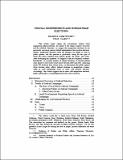| dc.description.abstract |
Reseña:This Article argues against the conventional wisdom aboutnonpartisan judicial elections. In contrast to the claims of policy advocatesand the scholarly literature, we suggest that nonpartisan elections do notnecessarily encourage greater judicial independence than partisan elections.Instead, nonpartisan elections create the incentive for judges to cater topublic opinion, and this pressure is particularly strong for the types ofissues that attract attention from interest groups, the media, and voters.After developing this argument, we support it with new empirical evidence.Specifically, we examine patterns of judicial decisions on abortion-relatedcases heard by state courts of last resort between 1980 and 2006. Analyzingnearly 600 decisions from sixteen states, we demonstrate that public opinionabout abortion policy affects judicial decisions in nonpartisan systems,while no such relationship exists in states with partisan elections.Accordingly, this Article suggests that in states with nonpartisan elections,public opinion plays an underappreciated role in the courtroom.This Article argues against the conventional wisdom about nonpartisan judicial elections. In contrast to the claims of policy advocatesand the scholarly literature, we suggest that nonpartisan elections do notnecessarily encourage greater judicial independence than partisan elections.Instead, nonpartisan elections create the incentive for judges to cater topublic opinion, and this pressure is particularly strong for the types ofissues that attract attention from interest groups, the media, and voters.After developing this argument, we support it with new empirical evidence.Specifically, we examine patterns of judicial decisions on abortion-relatedcases heard by state courts of last resort between 1980 and 2006. Analyzingnearly 600 decisions from sixteen states, we demonstrate that public opinionabout abortion policy affects judicial decisions in nonpartisan systems,while no such relationship exists in states with partisan elections.Accordingly, this Article suggests that in states with nonpartisan elections,public opinion plays an underappreciated role in the courtroom. |

